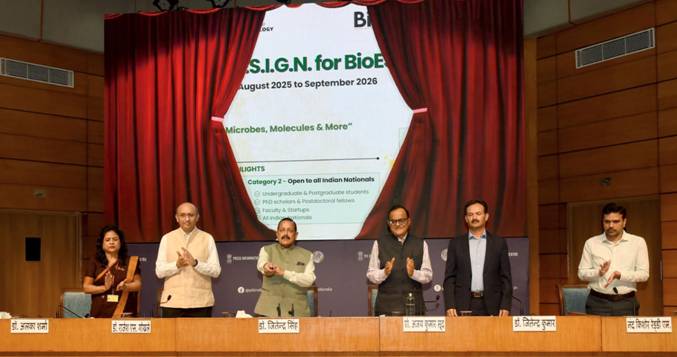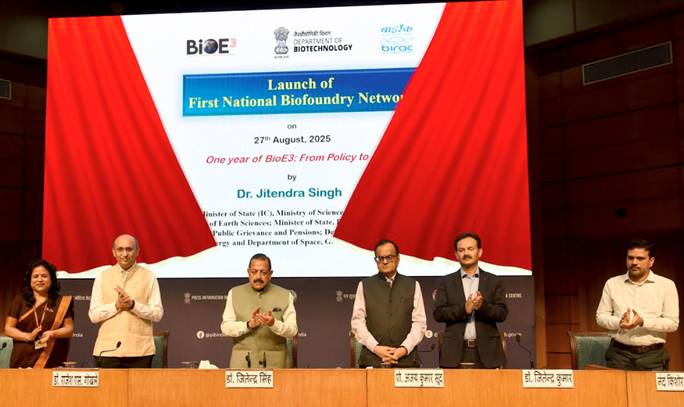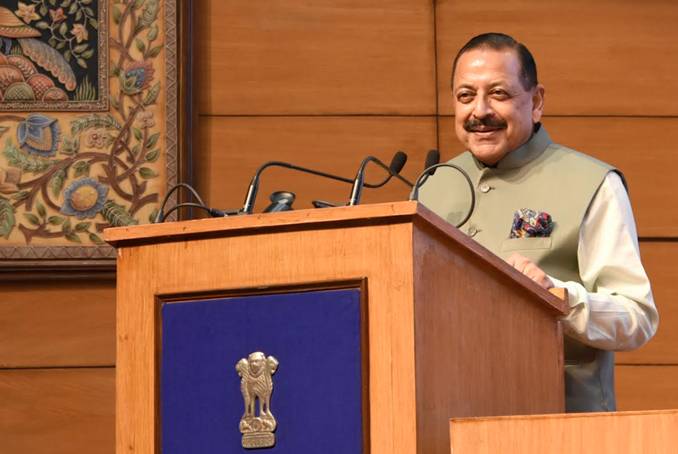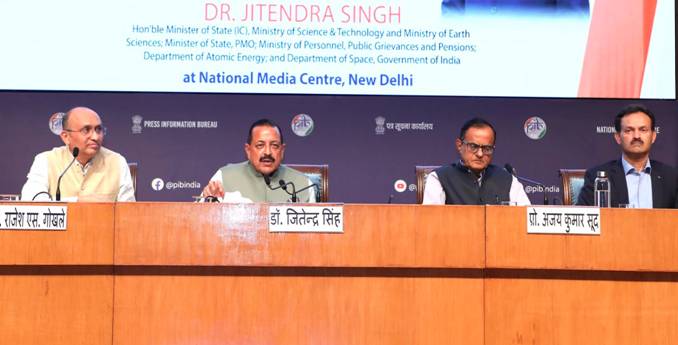Ministry of Science & Technology
India’s Bioeconomy to Touch $300 Billion by 2030, Says Dr. Jitendra Singh
Dr. Jitendra Singh Marks One Year of BioE3 Policy with Launch of Youth Challenge
Minister Unveils First National Biofoundry Network to Strengthen Indigenous Biomanufacturing
India’s Biotechnology Sector Marks Major Milestones Under BioE3 Policy
प्रविष्टि तिथि:
27 AUG 2025 5:16PM by PIB Delhi
Marking one year of the BioE3 (Biotechnology for Economy, Environment and Employment)Policy, Union Minister of Science and Technology Dr. Jitendra Singh today launched the BioE3 Challenge for Youth and the country’s first National Biofoundry Network, calling it a step towards making biotechnology a driver of India’s economy, environment and employment.
“India’s bioeconomy has grown from just $10 billion in 2014 to $165.7 billion in 2024, and we are now working towards a target of $300 billion by 2030,” said the Minister. He said that India’s biotechnology sector has made rapid strides over the past year under the BioE3 Policy, achieving several key landmarks that are shaping the country’s bioeconomy.
Speaking at an event marking One Year of BioE3: From Policy to Action, Dr. Jitendra Singh noted that the Department of Biotechnology (DBT), along with its stakeholders, has set up new institutions, launched joint research initiatives, and forged national and international partnerships in a short span of time.
Among the notable achievements, the Minister highlighted the inauguration of India’s first Biomanufacturing Institute at Mohali, the establishment of Bio-Artificial Intelligence hubs, biomanufacturing hubs and biofoundries across the country, and the launch of more than a dozen joint research calls covering advanced areas such as cell and gene therapy, climate-smart agriculture, carbon capture, and functional foods. DBT has already received over 2,000 proposals under these categories.
Dr. Jitendra Singh also pointed to a memorandum of understanding signed between DBT and the Indian Space Research Organisation (ISRO) for cooperation in space biotechnology and biomanufacturing, as well as a joint working group to identify priority projects. Earlier this year, three DBT-backed experiments were carried out on the International Space Station by Gaganyatri Group Captain Subhanshu Shukla.
At the State level, DBT has initiated centre-state partnerships, including an MoU with Assam to establish a BioE3 Cell with an action plan for the state. On the global front, India’s missions in 52 countries have shared inputs on the BioE3 policy, with DBT and the Ministry of External Affairs working on follow-up actions.
As part of the event, Dr. Jitendra Singh also launched the BioE3 Challenge for Youth—a nationwide call to young innovators under the theme “Design Microbes, Molecules & More”. The initiative, explained by DBT Secretary Dr. Rajesh Gokhale, invites school students (Classes 6–12), university students, researchers, faculty, startups and Indian nationals to design safe-by-default biological solutions addressing challenges in health, agriculture, environment, and industry. The challenge will be announced on the first of every month beginning October 2025, with the top 10 winning solutions each receiving a cash award of ₹1 lakh along with recognition and mentoring support. In addition, 100 selected awardees will be eligible for funding of up to ₹25 lakh, provided in two tranches through BIRAC, to convert their ideas into proof-of-concept solutions. These projects will also gain access to facilities and incubation support at BRIC+ institutions across India. The programme aims to empower grassroots innovators, foster youth-led change, and strengthen India’s journey towards a sustainable and self-reliant bioeconomy. The BioE3 Challenge for Youth is anchored in the DESIGN framework, which guides participants to Define real needs, build Evidence-first solutions, ensure Sustainability by design, pursue Integration with other technologies and policies, develop strategies to Go-to-market, and create a Net-positive impact through measurable outcomes in jobs, inclusion, and equitable access.
The Minister also underscored the launch of the first National Biofoundry Network, involving six institutions to help scale up proof-of-concept developments, enhance indigenous biomanufacturing, and create employment opportunities.
“India’s bioeconomy has grown from just $10 billion in 2014 to $165.7 billion in 2024, and we are now working towards a target of $300 billion by 2030,” Dr. Jitendra Singh said, urging young Indians to actively participate in the BioE3 Challenge for Youth, which invites ideas for safe and sustainable biotechnology innovations.
The initiatives, he said, reflect the government’s commitment to strengthening biotechnology as a pillar of India’s economic growth while ensuring benefits reach citizens in diverse sectors—from agriculture and healthcare to energy and environmental conservation.
Prof. Ajay Kumar Sood, Principal Scientific Adviser to the Government of India, said that through the BioE3 policy, India has taken a strategic step towards building a green, clean and prosperous nation by leveraging biotechnology to advance public health, safeguard the environment and address climate change, thereby contributing to the vision of an Atmanirbhar Bharat. He noted that biology is no longer an isolated discipline but is increasingly converging with engineering, architecture and space science, driving innovations such as biophilic urban designs, algae-based carbon capture, genetically engineered plants, biodegradable plastics, prosthetic organs, organ-on-a-chip systems, and space biology experiments. Highlighting that the fusion of biology with emerging tools like Artificial General Intelligence (AGI) opens new and meaningful career avenues for India’s youth, Prof. Sood emphasized that with the country’s strong STEM base and the Department of Biotechnology’s leadership, BioE3 will accelerate research and development, create employment, and build a sustainable bioeconomy that will shape India’s future.
The event also featured addresses by Dr. Alka Sharma, Senior Adviser, DBT; Dr. Jitendra Kumar, Managing Director, BIRAC who shared insights on the future course of the BioE3 policy.




*****
NKR/PSM
(रिलीज़ आईडी: 2161247)
आगंतुक पटल : 1982